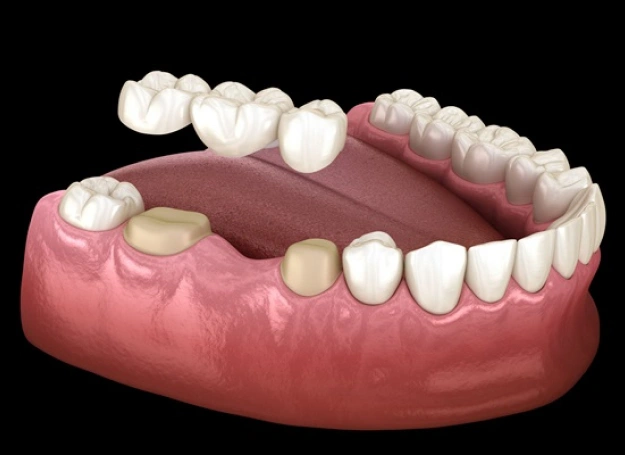
Restore Teeth with Crowns & Bridges
What Are Dental Crowns and Bridges?
Dental crowns restore both the function and appearance of your teeth. Crafted from durable and aesthetically pleasing porcelain, crowns are designed to closely resemble natural teeth. Dr. Trogan places the crown over your damaged tooth, fully covering it down to the gum line to protect its original structure. Crowns are typically used for teeth with large fillings, cracks, deep cavities, severe wear, or following a root canal. They can also serve a cosmetic purpose to enhance the appearance of a tooth.
Bridges, on the other hand, consist of a series of crowns used to replace missing teeth. To create a bridge, the teeth on either side of the gap are prepared for crowns, and a custom bridge is crafted to fill the empty space. Bridges offer an alternative to partial dentures or implants for replacing missing teeth. The process begins with local anesthesia to numb the area, followed by preparing the teeth and taking impressions to send to our dental lab for custom creation. In the meantime, you’ll wear a temporary crown or bridge until the final restoration is ready for fitting.
When Are Dental Crowns Required?
Dr. Trogan recommends dental crowns if you have a:
- Very large filling
- Broken or fractured tooth
- Broken filling
- Worn-down tooth
- Discolored tooth
- Misshapen tooth
- Completed root canal procedure
- Dental implant that needs covering
- Bridge that needs an attachment
What Should I Expect When Getting Dental Crowns?
Before your procedure, Dr. Trogan will numb the targeted area. She then prepares your tooth by filing down its surface and sides to create space for the crown. If a significant portion of your tooth is missing, she may use a filling material to build it up and provide support for the crown.
Next, Dr. Trogan will take an impression of your tooth and send it to a dental lab to create a custom crown. In the meantime, you will wear a temporary crown. During your follow-up appointment, Dr. Trogan will securely cement your permanent crown in place.
What Are the Advantages of Dental Crowns?
Dental crowns provide several benefits for your damaged tooth, including:
- Restoration
- Strengthening
- Protection
- Ensuring it stays in place
How Should I Care for My Dental Crowns?
To care for your dental crowns, maintain good oral hygiene habits as you would for your natural teeth. Brush at least twice a day with a non-abrasive toothpaste and floss daily. The dental team also recommends using an antibacterial mouth rinse each day to preserve the durability of your crown and support overall oral health.
If you have a damaged tooth, you may be a candidate for a dental crown. Contact our friendly office staff or schedule your appointment online today.